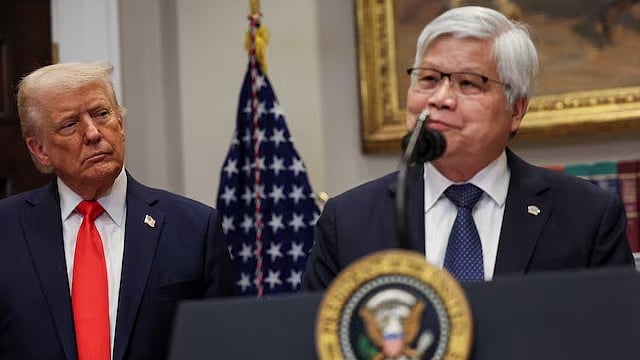
US President Donald Trump listens to CC Wei, Chairman and CEO of TSMC, as they make an announcement about an investment from Taiwan Semiconductor Manufacturing Company (TSMC) in Washington, DC on March 3, 2025.
Credit: Reuters File Photo
Taiwan Semiconductor Manufacturing Company (TSMC), the world's largest chipmaker, announced plans for a $100 billion investment in the United States, which includes building five new chip factories in the coming years.
The decision was unveiled by TSMC CEO CC Wei alongside US President Donald Trump at the White House on March 3, 2025.
Over the next four years, TSMC would expand its operations in Arizona to produce chips for artificial intelligence and other high-tech, Wei told presspersons.
The announcement was made after pressure from Trump, who has urged Taiwan to reduce its dominance in advanced semiconductor production and relocate more manufacturing to the US. He also warned of potential tariffs if Taiwan does not comply.
Following the announcement by Wei, Trump celebrated the deal as a major financial pledge by a private company since his return to office in January, claiming it would create thousands of jobs, particularly in the swing state of Arizona.
However, the announcement has sparked concerns in Taiwan, where the semiconductor sector is seen as a vital part of the island's economy and a crucial defense against potential Chinese aggression.
On March 6, Taiwan President Lai Ching-te reassured citizens that the investment would benefit Taiwan, the US, and TSMC, claiming that Taiwan would "confidently cross the Pacific Ocean and expand eastward to the American continent."
TSMC’s chairman also stressed that production in Taiwan would not be affected by the company’s growing investments in the US.
Despite these assurances, not all Taiwanese leaders are convinced.
Former President Ma Ying-jeou criticised the Taiwan government for conceding to US demands, calling the deal a "major national security crisis."
According to the Daily Mail, Ma accused the ruling Democratic Progressive Party (DPP) of "selling TSMC" to Trump as a "protection fee."
Ma warned, "Taiwan is facing a more serious crisis. Three years after the Russian-Ukrainian war, Ukraine's situation is obvious to all." He questioned, "Don't forget, USA President Trump is a businessman. All interests come first. Is it enough to sell TSMC? What else will be sold?"
Opposition Kuomintang lawmaker Fu Kun-chi also voiced similar concerns, asking, "If TSMC becomes 'American Semiconductor Manufacturing Company,' where will Taiwan's security be then?"
While Taiwan is a self-governing island, Beijing sees it as part of China and has threatened to use force to take control. The US does not officially recognise Taiwan as a country but remains its strongest ally and largest arms supplier.
However, US support for Taiwan may be waning under Trump’s administration, with Trump suggesting that Taiwan should spend more on its defense and reduce its dependence on the US.
(With inputs from Reuters)
